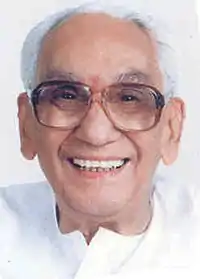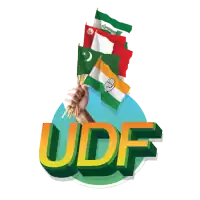K. Karunakaran
Kannoth Karunakaran (5 July 1918 – 23 December 2010) was an Indian politician and member of the Indian National Congress (INC). He served as the Chief Minister of Kerala four times: for a brief period from March 1977 to April 1977, another short term from December 1981 to March 1982, after which president's rule was invoked in the state, and subsequently served from May 1982 to May 1987, and eventually from June 1991 to May 1995. He is the founder of the United Democratic Front (UDF), which is a political alliance in Kerala led by INC.[7]
K. Karunakaran | |
|---|---|
 | |
| Minister of Industry[1][2] | |
| In office 11 June 1995 – 16 May 1996 | |
| Prime Minister | P. V. Narasimha Rao |
| Preceded by | Ajit Singh |
| Succeeded by | Suresh Prabhu |
| 5th Chief Minister of Kerala | |
| In office 24 June 1991 – 16 March 1995 | |
| Governor | B. Rachaiah |
| Preceded by | E. K. Nayanar |
| Succeeded by | A. K. Antony |
| In office 24 May 1982 – 25 March 1987 | |
| Governor | |
| Preceded by | President's rule |
| Succeeded by | E. K. Nayanar |
| In office 28 December 1981 – 17 March 1982 | |
| Governor | Jothi Venkatachalam |
| Preceded by | President's rule |
| Succeeded by | President's rule |
| In office 25 March 1977 – 25 April 1977 | |
| Governor | N. N. Wanchoo |
| Preceded by | C. Achutha Menon |
| Succeeded by | A. K. Antony |
| Minister of Home Affairs, Government of Kerala[3] | |
| In office 25 September 1971 – 25 March 1977 | |
| Chief Minister | C. Achutha Menon |
| Preceded by | C. Achutha Menon |
| Succeeded by | K. M. Mani |
| Member of the Kerala Legislative Assembly[4] | |
| In office 1967 – 1996 | |
| Constituency | Mala (7 Terms) |
| Member of Parliament, Lok Sabha[4][5] | |
| In office 1998 – 1999 | |
| Constituency | Thiruvananthapuram |
| In office 1999 – 2004 | |
| Constituency | Mukundapuram |
| Member of Parliament, Rajya Sabha[4][5] | |
| In office 1995 – 1997 | |
| In office 1997 – 1998 | |
| In office 2004 – 2005 | |
| Member of the Travancore–Cochin Legislative Assembly[5][6] | |
| In office 1 July 1949 – 23 March 1956 | |
| Member of the Kochi Legislative Assembly[5][6] | |
| In office 1948 – 1949 | |
| Councillor of Thrissur[6] | |
| In office 1945 – 1948 | |
| Personal details | |
| Born | 5 July 1918 Chirakkal, Madras Presidency, British India (present day Kannur, Kerala, India) |
| Died | 23 December 2010 (aged 92) Thiruvananthapuram, Kerala, India |
| Nationality | Indian |
| Political party | Indian National Congress |
| Spouse(s) | Kalyanikutty Amma
(m. 1954; died 1993) |
| Children | K. Muraleedharan Padmaja Venugopal |
| Parents |
|
| As of 2 November, 2007 Source: Government of Kerala | |
He was instrumental in several massive infrastructure projects in Kerala which includes the Jawaharlal Nehru Stadium in Kochi,[8] and the Cochin International Airport, both of which were sanctioned during his last stint as Chief Minister.[9]
K. Karunakaran was close to former prime ministers Indira Gandhi and Rajiv Gandhi.[7]
Early life
Karunakaran was born on 5 July 1918 in Chirakkal near Kannur in a Hindu Maarar family of Thekkedathu Ravunni Marar and Kannoth Kalyani Amma. He had two elder brothers - Kunjirama Marar and Balakrishna Marar, a younger brother - Damodara Marar (Appunni Marar) and a sister - Devaki, who died when Karunakaran was five years old. His father was a record keeper in the erstwhile Malabar District.
During his childhood, Karunakaran was an expert in swimming, painting, football and volleyball. Though he was named Karunakara Marar, he later dropped his caste title, and came to be known just by his name.
Karunakaran started his school education by joining Vadakara Govt. Lower Primary School in 1923. Later, he studied in Andallur govt. school and the famous Raja's High School near his home in Chirakkal. After passing matriculation from Raja's High School, he went to Thrissur and joined Govt. Fine Arts' college, from where he took degrees in painting and mathematics. For treating an eye disorder, he went to his maternal uncle's home in Vellanikkara near Thrissur, along with his elder brother Kunjirama Marar. Later, he married his maternal uncle's daughter Kalyanikkutty Amma in 1954 at Guruvayoor Temple, when he was 36 and Kalyanikkutty Amma was 30. K. Muraleedharan and Padmaja Venugopal, famous Congress politicians, are their children. It was in 1993, when Karunakaran was the Chief Minister, that Kalyanikkutty Amma died.
Political life
In 1937, Karunakaran joined the flood relief camps that were conducted by V. R. Krishnan Ezhuthachan, C. Achutha Menon, R.M. Manakkalath and other leaders of Prajamandalam, an early freedom struggle movement in Cochin State. He became a member of the Indian National Congress and began to wear Khadi. He also participated intensively in the trade union activities in the vast Thattil rubber estates where his uncle Raghavan Nair was a 'writer'. During this time, he would spare his artistic skills and labour in helping the workers' union (later INTUC) for their wall writings and campaigns. Gradually, he was picked up by Panampilly Govinda Menon as his most favourite follower. In due course, Karunakaran rose to a level of the senior-most Leader of the Indian National Trade Union Congress (INTUC). The INTUC later became one of the largest trade unions in India having with over 4 million memberships today. He went on to become the Thrissur District Congress Committee President, after which he was elected to the Cochin Legislative Assembly twice before the formation of Kerala State. He contested in the 1957 Kerala Legislative Assembly Elections against a strong trade unionist and an ex. congressmen, DR.A R Menon, when no one in the state Congress party came up front to oppose Mr. Menon. When the results came, Karunakaran lost by less than one thousand votes, and A R Menon was heard saying, "Njan aanu shericku thottatu. (I am the one who really lost)."
Karunakaran was denied a Congress ticket in the 1960 Kerala Legislative Assembly Elections, after which he was allotted a ticket to contest from a strong Communist stronghold, Thrissur's Mala constituency in the 1965 Kerala Legislative Assembly Elections. Karunakaran surprised everyone by defeating the left front candidate by more than 3000 votes, and since represented the constituency in 1967, 1970, 1977, 1980, 1982, 1987, and 1991. He was first elected as the Congress Legislative Party leader in 1967. He took over the State Congress Legislative Party's machinery when Congress was down to only 9 MLAs in the assembly.
The VIP pavilion in the Jawaharlal Nehru Stadium in Kaloor, Kochi is named after him in his honour.[9]
Death
Karunakaran died on 23 December 2010, aged 92, at Ananthapuri Hospital in Thiruvananthapuram. He was suffering from respiratory problems, fever and other age related diseases and had been hospitalized since 21 October 2010. His condition worsened following a stroke and died following a cardiac arrest, as declared by doctors at 5:30 PM. It was coincidental that his death and Narasimha Rao's death was on same date, Rao had died six years earlier in 2004. Karunakaran had played key role in backing the Rao Government and later Rao had dismissed Karunakaran from the chair of Chief Minister of Kerala.[10][11] His funeral was attended by the then prime minister Manmohan Singh and the AICC chief Sonia Gandhi.
Biographies
The first biography on him titled K.Karunakaran was written by Vrindavanam Venugopalan. Published by Islamiya Books, Aluva in 1992.
Controversies
K. Karunakaran was the home minister of Kerala during the emergency period. After the Emergency, the Rajan case rocked Kerala politics and Karunakaran was forced to step down as the case attracted national attention. A habeas corpus petition was filed by T.V. Eachara Warrier asking the state machinery to produce his son Rajan (a student of Regional Engineering College, Calicut who actively participated in protests against the emergency declared by the Indira government) in court. Rajan was allegedly killed by the police at Kakkayam police torture camp and the body disposed off. The legal battle led by Rajan's father became one of the most remembered human rights fights in the state and diminished Karunakaran's popularity. The book Memories of a father is a lamentation of a father over his son's brutal death.
Karunakaran was an accused in the Palmolein Oil Import Scam, which was pending before the Supreme Court at the time of his death. Allegations of mass land acquisition in violation of Benami just before the construction of Cochin International Airport had also been levelled at him.
References
- Babu, Sathish (18 October 2014). "K. KARUNAKARAN". Prominent Indian Personalities. Retrieved 25 June 2016.
- "Former Kerala Chief Minister Karunakaran passes away". The Hindu. 24 December 2010. Retrieved 25 June 2016.
- "KERALA's FIRST LEGISLATIVE ASSEMBLY". Information & Public Relations Department. Archived from the original on 8 July 2016. Retrieved 25 June 2016.
- "Shri K. Karunakaran and Mala". mala.co.in. Mala.co.in. Retrieved 25 June 2016.
- "K. Karunakaran". niyamasabha.org. Information System Section, Kerala Legislative Assembly, Thiruvananthapuram. Retrieved 25 June 2016.
- "KERALA NIYAMASABHA: K.KARUNAKARAN". stateofkerala.in. stateofkerala.in. Retrieved 25 June 2016.
- Who was K Karunakaran?. Press Trust of India. NDTV. Retrieved 23 December 2010
- "VIP Football Pavilion at Kaloor Stadium Named after K Karunakaran". The New Indian Express. Retrieved 24 November 2020.
- "Karunakaran Pavilion". The Times of India. 14 July 2014. Retrieved 14 July 2014.
- Karunakaran passes away. The Hindu. Retrieved on 23 December 2010
- Joe A Scaria (23 December 2010). "Karunakaran passes away, bringing curtains down on era in Kerala politics". The Economic Times. Retrieved 23 December 2010.
- The Hindu on Karunakaran
- News of Death of Karunakaran
- facebook page of Karunakaran
- Reporter Tv report on K Karunakaran on YouTube
| Wikimedia Commons has media related to K. Karunakaran. |
| Political offices | ||
|---|---|---|
| Preceded by C. Achutha Menon |
Chief Minister of Kerala 1977 |
Succeeded by A. K. Antony |
| Preceded by E.K. Nayanar |
Chief Minister of Kerala 1981–1987 |
Succeeded by E.K. Nayanar |
| Preceded by E.K. Nayanar |
Chief Minister of Kerala 1991–1995 |
Succeeded by A. K. Antony |
